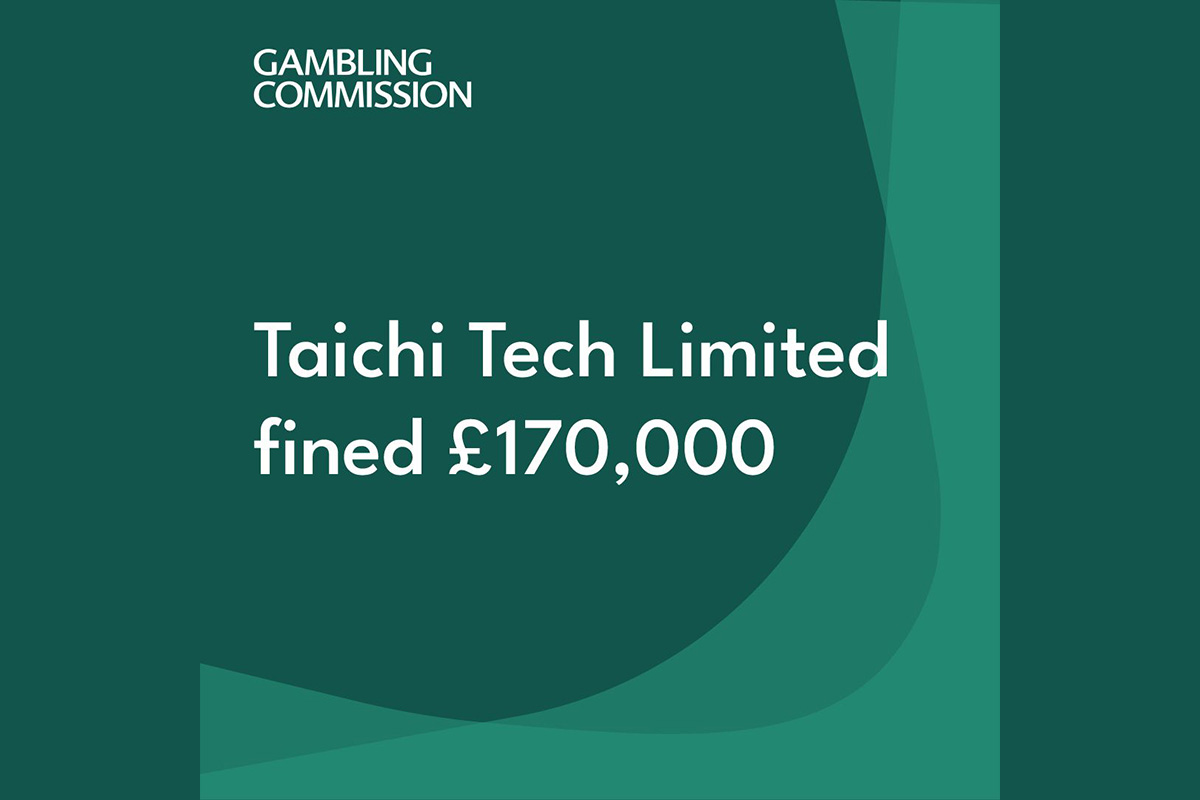Compliance Updates
Taichi Tech Limited Fined £170,000 for Unfair Terms and Conditions

An online gambling business has been fined £170,000 by the UK Gambling Commission (UKGC) for regulatory failures including the use of unfair terms and conditions.
Taichi Tech Limited – trading as Fafabet – will also have to undergo a third-party audit to ensure it is effectively implementing its anti-money laundering and safer gambling policies, procedures and controls.
A Commission investigation revealed Taichi Tech Limited had stated that: “Fafabet have the right at their own discretion to close accounts or forfeit winnings” within their bonus terms for new casino promotions.
The Gambling Commission’s investigation concluded that Taichi Tech Limited breached the fair and open licensing condition by including a discretionary term allowing the operator to close customer accounts or forfeit winnings without clear justification. Such terms lack transparency and may lead to unfair outcomes for consumers.
The Consumer Rights Act 2015 (CRA) is the general consumer protection legislation, and it is explicitly referenced within the Licence Conditions and Codes of Practice (LCCP) that gambling companies must follow. The LCCP requires licensees to ensure that their terms and practices are fair, clear, and do not breach consumer protection law. Operators must therefore have regard to the CRA as part of their overall compliance obligations under the LCCP.
The investigation also found failures relating to anti-money laundering and social responsibility breaches.
Examples included:
• some customers were able to gamble large sums within a short period of time, despite the operator holding limited customer information
• in certain cases, individuals exhibiting potential markers of harm — such as high-velocity spending over short periods — received insufficient customer interaction from the operator
• where safer gambling emails were sent but not acknowledged by the customer and concerning behaviour continued, there was no further follow-up or intervention by the operator.
John Pierce, Director of Enforcement and Intelligence at the Gambling Commission, said: “We expect all operators — regardless of their size or customer base — to comply with consumer protection legislation and ensure their terms and conditions meet regulatory standards.
“Licensed operators must ensure their terms are clear, fair, and transparent, so customers fully understand what to expect.”
He added that the Commission’s assessment identified deficiencies in the operator’s social responsibility and anti-money laundering controls, including failures to effectively manage risk and implement adequate consumer protection measures.
The operator has acknowledged that it previously fell short of the standards expected by the Commission and has since taken steps to address these shortcomings. As part of the regulatory outcome, the operator is required to commission an independent third-party audit to provide assurance of ongoing compliance with all relevant regulatory requirements.
The post Taichi Tech Limited Fined £170,000 for Unfair Terms and Conditions appeared first on European Gaming Industry News.
California
CGCC Gaming Policy Advisory Committee (GPAC) Meeting: Jan 20, 2026

The California Gambling Control Commission (CGCC) has scheduled a meeting of the Gaming Policy Advisory Committee (GPAC) for 1:00 p.m. on Tuesday, January 20, 2026.
The committee is established under Business and Professions Code Section 19817 to provide advisory recommendations to the Commission on regulatory policy, with a specific focus on integrity and problem gambling.
Meeting Attendance Information
The meeting will be conducted in a hybrid format, allowing for both in-person and remote participation.
-
In-Person Location: 2399 Gateway Oaks Drive, Hearing Room 100, Sacramento, CA 95833.
-
Virtual Access: Zoom Meeting Link
-
Phone Access: 1-888-475-4499 (Toll-free) | Meeting ID: 285 757 8614
Key Agenda Items
The agenda focuses on internal governance, regulatory controls for third-party providers, and administrative updates:
-
GPAC Roles and Responsibilities: A review of the mission statement, adherence to the Bagley-Keene Open Meeting Act, and expectations for member conduct and responsiveness.
-
Current Projects: Update and discussion on Third-Party Providers of Proposition Player Services (TPPPS) – Internal Controls, led by subcommittee members Kirill Yermanov and Michael Hill.
-
New Discussion Items:
-
Third-Party Provider Employee Table Coverage.
-
Procedures for Lost or Damaged Employee Badges.
-
-
Administrative Updates: An update on the Category G vacancy (Public Member with accounting/business background).
2026 Committee Composition
The committee consists of 10 members (expanding to 12 if pending legislation like AB 77 is finalized), split equally between the cardroom industry and the public.
| Member Name | Category / Role | Term Expiry |
| Trevor Dewar | Category A (Bureau of Gambling Control) | 12/31/2026 |
| Sosha Marasigan-Quintero | Category B (Problem Gambling/Addiction) | 12/31/2026 |
| Michael Hill | Category C (TPPPS Representative) | 12/31/2027 |
| David Fried | Category D (Cardroom with 25+ Tables) | 12/31/2026 |
| Michael Koniski | Industry Representative | — |
| Emmanuel Macalino | Industry Representative | — |
| Linda Ng | Public Representative | — |
| John Stacy | Industry Representative | — |
| Kirill Yermanov | Public Representative | — |
Advisors: Lisa Wardall (Executive Director) and Jason Pope (Chief Counsel).
The post CGCC Gaming Policy Advisory Committee (GPAC) Meeting: Jan 20, 2026 appeared first on Americas iGaming & Sports Betting News.
Compliance Updates
Finland’s Gambling Reform Is Official – What Happens Next?

The wait is over: The Finnish Parliament has officially approved the new gambling legislation. In a decisive plenary session, MPs voted 158 in favor to 9 opposed, with 32 abstaining. The text remained unchanged from the version presented in previous weeks, solidifying the framework for Finland’s transition from a monopoly to a licensed market.
With the political uncertainty resolved, the focus now shifts to implementation. For operators, this means the race to compliance—and market entry—has effectively begun.
The Confirmed Timeline

With the legislation passed, the roadmap to the market opening is now set. Operators must use the coming months to prepare for a rigorous licensing process.
-
Early 2026: The application window is expected to open. The regulator will begin accepting and reviewing license applications.
-
2026 (Throughout): The “preparatory year.” This period is dedicated to vetting applicants, ensuring technical compliance, and establishing the new supervisory authority.
-
January 1, 2027: The regulated Finnish market officially opens. Licensed operators can go live with betting and online casino services.
Entering the Finnish Market with Nordic Legal
Navigating a new jurisdiction is complex, but it doesn’t have to be inefficient. With extensive experience advising on gaming licences across the Nordic markets, Nordic Legal brings a proven, practical approach to the Finnish process.
Efficiency Through Synergy If you already work with us in Denmark or Sweden, we ensure your Finnish licence application isn’t a “start from scratch” project. We build directly on our existing knowledge of your organisation and systems.
Your usual Nordic Legal contact will coordinate directly with our Helsinki team at no extra cost. This integrated approach saves you time and avoids the frustration of duplicating work you’ve already done for other Nordic licenses.
Our Approach We focus on smart compliance:
-
Reusing documentation where regulations overlap.
-
Anticipating regulatory questions before they are asked.
-
Aligning requirements for technical standards and responsible gambling.
-
Engaging constructively with the Finnish authority to ensure a smooth process.
The Finnish Licence Application Package
To support your entry, we offer a comprehensive package designed to handle the heavy lifting:
-
Translation of all required documents.
-
Guidance and completion of complex application forms.
-
Full project management from start to submission.
-
Direct communication with the Finnish regulator on your behalf.
Next Steps
The window for preparation is narrowing. Contact your usual Nordic Legal advisor today to discuss the new legislation or our Licence Application Package. Alternatively, reach out to us directly to secure your place in Finland’s upcoming regulated market.
The post Finland’s Gambling Reform Is Official – What Happens Next? appeared first on Gaming and Gambling Industry Newsroom.
Compliance Updates
Updated FATF Lists of High-risk Jurisdictions

Reading Time: < 1 minute
The Danish Gambling Authority has called attention to FATF’s (Financial Action Task Force) updated lists of high-risk jurisdictions: the Grey List (jurisdictions under increased monitoring) and Black List (call for actions). Among other things, gambling operators must include FATF’s lists of high-risk jurisdictions when risk assessing players.
Jurisdictions listed on the Grey List:
Algeria, Angola, Bolivia, Bulgaria, Cameroon, the Ivory Coast, DR Congo, Haiti, Kenya, Laos, Lebanon, Monaco, Namibia, Nepal, South Sudan, Syria, Venezuela, Vietnam, the Virgin Islands and Yemen.
Jurisdictions listed on the Black List:
Democratic People’s Republic of Korea, Iran and Myanmar
Gambling operators are required to conduct enhanced customer due diligence (EDD) pursuant to section 17(1) of the Danish AML Act, if a player is assessed to impose a higher risk of the gambling operator being misused for money laundering or terrorist financing.
Gambling operators shall conduct this risk assessment based on Annex 3 to the AML Act (high-risk factors) which includes the FATF high-risk country lists (the so called black list and grey list)
It is not required that gambling operators perform EDD if a country is listed on the FATF’s list. EDD are only a requirement for players from jurisdictions listed in the EU Regulation of High Risk Third Country list pursuant to. 17(2) of the AML Act.
The post Updated FATF Lists of High-risk Jurisdictions appeared first on European Gaming Industry News.
-

 Hold and6 days ago
Hold and6 days agoPragmatic Play Rings in 2026 with Joker’s Jewels Hold & Spin™
-

 iGaming News 20266 days ago
iGaming News 20266 days agoSpinomenal Rings in 2026 with Japanese-Inspired “Kami Reign Ultra Mode”
-

 Latest News6 days ago
Latest News6 days agoFrom ‘Mummyverse’ to Crash Games: Belatra Reviews a Landmark 2025
-

 Five Elements Slot6 days ago
Five Elements Slot6 days agoPG Soft Concludes 2025 with High-Volatility Launch: Mythical Guardians
-

 Barbarossa Dragon Empire5 days ago
Barbarossa Dragon Empire5 days agoPeter & Sons Expands Ontario Footprint with Major Casino Time Content Deal
-

 Akshat Rathee5 days ago
Akshat Rathee5 days agoIndian Esports 2026: Strategic Growth and the Asian Games Milestone
-

 Aztec Slot5 days ago
Aztec Slot5 days agoEvoplay Unveils Sunstone Riches: An Aztec Adventure Powered by the Sun
-

 Bespoke Gaming Studio6 days ago
Bespoke Gaming Studio6 days agoCreedRoomz and Casumo Forge Strategic Partnership to Elevate Live Casino Experience























